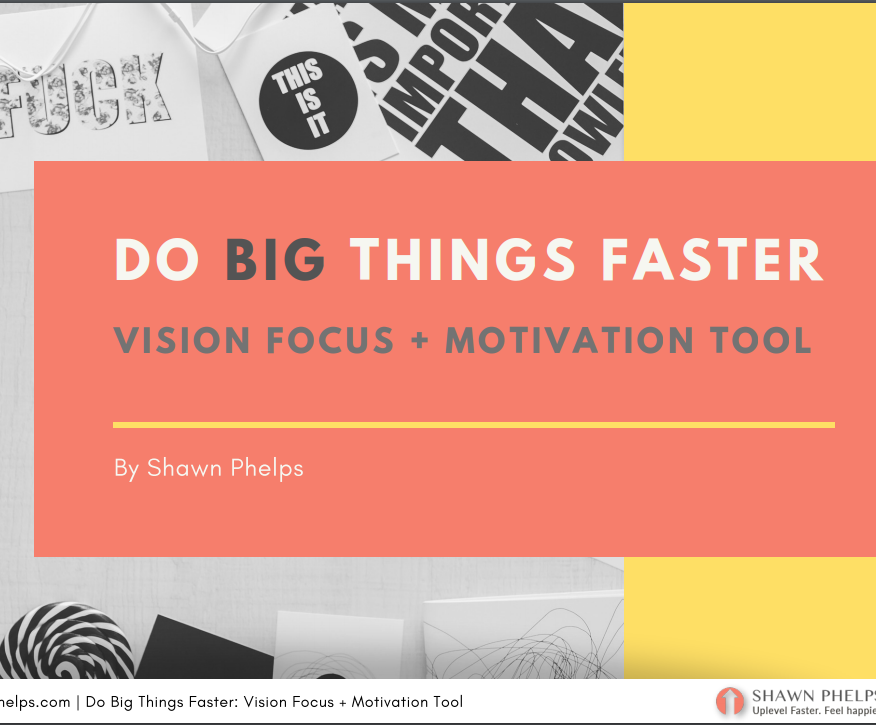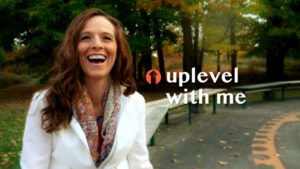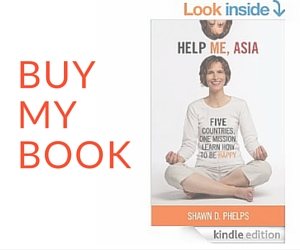This week I quit Facebook. Okay, I deactivated my account. I’m too chicken to delete it yet, but I probably will.
Don’t worry. This isn’t a post about why YOU should quit. It’s more of a nudge to think about how your online communities influence who you decide to be, and who you can become next. Not unlike living in a small town, if everyone knows you as one thing, it’s damn hard to become something else, because we all want to be “liked” and dread being “unfriended”.
Everyone, both on and off Facebook, expects you to be who you were when they knew you. This influences us on some level, whether we’re aware of it or not. But there are other problems as well, which I’ll get to later.
A Rebel Without a Clue
The people I went to high school with in 1988, who all “friended” me on Facebook, knew “Shawn” as a rebel without a clue, who spent a good chunk of time playing billiards while smoking Colts cigars, like a character in an S.E. Hinton novel. She was interesting, no doubt. In her own way, she was popular. But she was a mess. I don’t even remember what it was like to be her—and I’m grateful for that. She’ll always be an important part of my story, but I’m not her anymore. And she’s only one of many in the graveyard of my past identities.
The Exotic Wife
When I joined Facebook in 2007, I had just married into a whole new identity. My husband, T, was Laotian. His mother (who wasn’t thrilled her son had married a white girl) was one of the toughest women I’ve ever met. She snuck her four boys out of the country (while people shot at them) when T was 5. Unfortunately, his father remained there, imprisoned at a work camp, for well over a decade. None of the boys ever really got to know him. It was a helluva story, and now I was part it—I was the next chapter. And for someone who had spent years wandering the globe, feeling like I’d never belong in any one culture, it felt like the perfect thing.
Our wedding was a beautiful mish-mash of colourful traditions. We had two ceremonies, back to back: a proper Western-style deal in an old church with the stained glass windows and an Anglican minister, and a full-on Laotian Buddhist ceremony, where we sat around a stunning hand-made “tower” of paper flowers and curious traditional items—like eggs, for fertility. As per the Lao custom, everyone was served shots of whisky. And more shots. By the end of the night, the dance floor was rockin’ with over 100 Westerners and Laotians dancing like old friends (Lao-style, hands twisting and turning from side to side in a figure eight).
Many of these people ended up on my Facebook.
The Philanthropist, College Teacher and Corporate Facilitator
T and I took our holidays in Southern Laos, where we started an education charity, something I’d been dreaming of doing since my earlier solo travels in Asia. This identity was pretty cool too. People in Laos treated us like royalty. Ceremonies were held in our honour, where children danced for us and officials delivered long speeches. The principal invited us to her son’s birthday party, which ended with a riotous food fight, cake and laughing children everywhere.
Back in Canada, we ran the Toronto Songwriters Festival to raise money for our projects. I recruited 15 volunteers, mostly students from the magazine writing class I was teaching at a local college.
I also began teaching 2-day persuasive business communication workshops at major banks and insurance companies across Canada–this was a super conservative gig where I always showed up in a full business suit.
All these various people friended me on Facebook: indie musicians, students, volunteers, charity supporters, and even a few of the business professionals who had taken my workshops. I got lots of “likes” during these years.
But then the marriage ended and we closed the charity. I was no longer a wife or a beloved sister-in-law. And I was no longer the executive director of a children’s charity, or the manager of an indie music festival. I left the college teaching job because the pay wasn’t enough to live on, and the job facilitating workshops ended a few years later.
Facebook was damn awkward for a while there. To survive it, I unfriended all relatives related to the marriage and set out to find a new identity.
The Author and Couchsurfer
I started lurking on a website called Couchsurfing, because it was full of travellers—one of the few tribes I almost feel comfortable with (as an introvert with social anxiety, I’ve always sucked at cliques and tribes). On the site, every city had a listing of events where people would meet, often just for coffee or drinks. I swallowed my fear and ventured out to meet new friends. It was do or die. I was spending way too much time alone in my rented apartment, sinking into a pit of despair.
Soon, I had a whole stable of friends from places like the Netherlands, Croatia, Chile, Australia and more. It was fabulous. I went to an apple-pie baking party—the best party ever. I don’t remember how many pies we made, but I peeled a few buckets’ worth of apples that night, and I became famous for my homemade whipped cream. We went ice skating and gave out free hugs in Kensington Market (a huge stretch for an introvert).
They helped me organize my book launch, where I stood, shakily, in front of 100 people and read from my book: it was a chapter about three homeless boys I came across in Tibet—the inspiration for the children’s charity I eventually co-founded. Afterwards, magical conversations happened while people munched on spring rolls from the massive potluck buffet. I sold 80 books. It was one of the great highlights of my life, so far.
And, of course, they all joined my Facebook.
The Professional Volunteer
But I got tired of making close friends just to have them leave to go back to their home countries. It felt similar to when I used to travel for months at a time—people constantly passing in and out of my life. And I was still reeling from the loss of my old identities (wife, philanthropist).
Who am I now? I didn’t know.
In my book, “Help Me, Asia”—where I travelled through seven countries in search of the secrets to happiness—one of the key things I learned was the idea of ubuntu: I am what I share of myself with others. All the happy people I’d met lived this philosphy. So, I decided to do an experiment. I called it “The Year of Giving Myself Away”. The idea was that I’d work 1/3 of my time (as a brand storytelling consultant), volunteer 1/3 of my time, and spend the final 1/3 of my time doing inner transformative work—meditation, therapy—to keep the dogs of emotional doom at bay.
It was a wonderful year. I volunteered in two different seniors’ lunch programs, making and serving food. I worked in churches that served the homeless (in the Out of the Cold Program). I helped organize and run a permaculture conference—permaculture is a natural system of growing food and sharing it with the community. As part of that, I helped build a food garden for a youth shelter. Finally, I served coffee and struck up conversations with guests at a pay-what-you-can cafe in St. Jamestown.
Of course, many of the people I met during this experiment ended up on my Facebook.
After the year ended, I realized that, while I loved volunteering, it didn’t feel like my “tribe”. Frankly, I find something about charity work uncomfortable. I love how it creates community, but often I’ve felt it isn’t empowering for people. It puts them in the role of victim, which, I know from personal experience, is a dangerous place to put anyone. Also, it isn’t sustainable. All the groups I worked with were perpetually broke, and all the volunteers were burned out. The model just didn’t work.
Social Entrepreneur
This is when I became interested in social entrepreneurship. I’d been to the Centre for Social Innovation a few times for food events, and I loved the vibe. The people were bighearted but, unlike my friends doing charity work, they were more open to different models of helping people. To me, it felt like I’d finally found my home, my true tribe—entrepreneurs. And it was as surprising for me as it probably was for everyone on my Facebook. Maybe it shouldn’t have been that surprising, since my father and brother are both entrepreneurs. The joining factor seems to be that we’re all ambitious misfits.
Many of these social entrepreneurs ended up on my Facebook.
Now, instead of posting about charity work, it was all entrepreneurial meet-ups and business masterminds and conferences. And since I was actively building my own coaching business, I was also playing with marketing. I made videos and started posting a weekly blog.
Most of my old friends stopped “liking” my posts, but new friends filled the void.
Unconventional Business Coach and Purpose Finder
While I’d been doing brand storytelling for years, I started having these incredible experiences with clients. As I sat and talked with someone, I found I could tap into their True Self, from which I could “download” and write down words and images about their purpose and what they needed to do next to live it. Soon after, I “downloaded” a whole storyboard–a 3-act framework that made it easy to help people find and stay aligned with their purpose. I tested the framework and it worked for everyone I tried it on. Clients were blown away, and started telling their friends.
I knew something big was happening when a few people started approaching me at the Centre for Social Innovation to tell me that my name was making the rounds there. One of my clients had told people that our sessions together had been like doing ayahuasca–a unique spiritual drug known for giving people clarity on their life and purpose. Except he felt that I’d had a bigger impact on his life.
I felt flattered, but what the hell was I going to do with this?
You have to understand that, in my 20s and 30s, I was a business journalist—which included a stint as senior editor at Financial Post Business magazine. After that, I was the editor-in-chief of a national human resources magazine for three and a half years. I had taught business communications workshops in very conservative environments–if I told them my new thing included communicating with someone’s higher self, they’d laugh themselves silly.
All those people were on my Facebook too.
But once it became clear that this was what I was going to be doing with my life, I took a deep breath and waded in. I shared some of what I was doing for clients then, after a few months, I made a video about what it meant to be a “spiritual business coach”.
After that, things got pretty quiet on the “liking” front.
Unlikes
Some family members fell by the wayside. They didn’t know what to make of me. I even got into an online scuffle with a favourite uncle. The thing is, the old Shawn allowed everyone to make her the brunt of their jokes. The new Shawn was having none of that.
Even my childhood best friend pulled out. She said she didn’t like who I’d become.
When you change the rules of engagement, people won’t know what to make of you.
But I knew that if I was serious about helping others find the courage to stand up as their True Selves, I was going to have to do it too.
My True Self
Even though some people find my evolution strange and unnerving, I like who I’ve become. For the first time in 44 years, I have a core identity. I know who “Shawn” is. I don’t need other people to define that for me on Facebook or anywhere else. And I’m proud of the fact that you can’t put her in one box.
Who is Shawn? I’d say she’s an experiential artist, always investigating and pushing boundaries, so she can share what she has learned with others. She’s very intense and sucks at small talk, but that’s just because she’d rather get right down to what matters. If she goes to a party, which she rarely does, she’ll always find someone who needs help living their purpose and talk them through it. I’ve given up taking her to “fun” things like Halloween costume parties—I secretly hoped she’d learn how to enjoy a little silliness, but she just doesn’t get it. If there’s no opportunity to make a difference, she’ll be bored.
She gets me in trouble sometimes, because diplomacy is not her strong point, but I’m starting to genuinely like her. And I’m definitely curious to see what she’s going to do next. It helps that I don’t take her as seriously as I used to. After all, she’s just a character in the story of Life.
What’s my point? We all need to understand the story we are telling ourselves about ourselves. After all, it’s our story.
Am I Done With Facebook?
I don’t know for sure. I’m grateful to Mark Zuckerberg for inventing the thing. It has helped me through some very dark days over the years. Also, I happen to know a number of previously broke online entrepreneurs who are now getting rich using Facebook marketing, but I digress.
There were other good reasons I left, besides having to deal with my past identities. A big one is just that it was too distracting. I had a lot of truly wise and intelligent people posting in my news feed, and it was hard not to follow up on this “interesting” article or that “inspiring” video.
That said, there was also a lot of selling and bragging and subtle competition happening, social power plays that felt uncomfortable for me. If that’s how you get successful as an online entrepreneur, I may never make it. Why would I do something to other people that annoys ME?
The Value of the Tribe
Perhaps belonging to a specific tribe is overrated. Lately, watching the news, I’ve been thinking it’s an old paradigm we need to ditch. If we can start seeing all of humanity as one single tribe, then maybe we’ll stop killing each other.
Regardless, when we spend too much time within just one tribe, we will always be subconsciously affected and influenced by the identity that creates—it’s just the way we’re built.
Maybe it’s enough to just be a human being who genuinely gives a shit about other human beings.
I’m going with that, for now.

- It taps you into your purpose + life's calling.
- This gives you focus + motivation + momentum.
- It comes with a video tutorial + mini-course.
- + 6 days of life-changing secrets on harnessing the power of your subconscious mind to do bigger things faster + happier.



